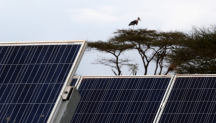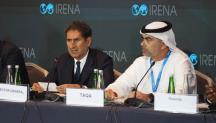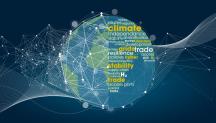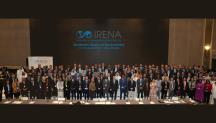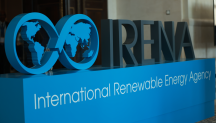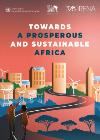

Towards a Prosperous and Sustainable Africa
Newsletter
Maximising the Socio-economic Gains of Africa’s Energy Transition
Download the Executive Summary
The next ten years will be key for sustainable development in Africa. As Africa is considered most vulnerable to climate change, African governments, supported by the international community, must define new pathways to sustainable prosperity. The best way forward is to adopt and implement changes that can help climate goals and find solutions that simultaneously enhance equality, justice, and social inclusion.
As joint authors of this report, RES4AFRICA, IRENA and UNECA call for enhanced co-operation among countries, public and private sectors, and the international community to accelerate sustainable development goals in Africa and support a just and inclusive energy transition.
IRENA’s analysis of socio-economic impacts presented in this report shows that Africa will be better off, across multiple dimensions, if the more ambitious 1.5°C Scenario route is pursued. Led by government spending, gross domestic product will be higher by an average of 6.4% to 2050 than in the Planned Energy Scenario. Similarly, economy-wide employment is 3.5% higher on average in the 1.5°C Scenario compared to the Planned Energy Scenario. The energy sector will have at least 28 million jobs in 2050, with renewable energy jobs rising from more than 0.3 million today to 8 million by 2050. The five welfare dimensions analysed – economic, social, environmental, distributional, and access – perform better under the 1.5°C Scenario.
Achieving sustainable energy transitions in Africa and maximising socio-economic benefits and value creation will require a systematic approach. To succeed in this effort, co-ordinated and well-defined actions are needed at three levels.
Actions at the macro-environment level:
- Integrate inclusiveness and social justice principles in the definition of energy strategies to leave no one behind.
- Establish sound governance and capacitate institutions to deliver on inclusive energy transition and sustainable development goals.
- Align energy infrastructure development planning to socio-economic development agendas and priorities.
- Define and create appropriate multi-stakeholder consultative platforms and partnerships for policy definition and target implementation
- Reinforce investments in the social infrastructure needed to deliver on sustainable economic and energy transition priorities.
- Enhance public awareness about the benefits of green industrialisation to build social support and acceptance.
Actions at the industry value chain level:
- Leverage South-South economic and industrial integration to build competitive African supply chains and manufacturing capacities.
- Scale up investments in science, technology, research, and innovation to promote sustainable technology uptake and local production.
- Set up smart local content regulations to support local value creation opportunities aligned with national competitive advantages.
- Reinforce technical and vocational training programmes to build the skillsets required to develop energy transition sectors.
Actions at the business environment level:
- Expand the innovative project and corporate financing schemes, such as green bonds, to increase capital availability for sustainable and impactful projects.
- Increase the participation of domestic financing and local financial institutions in support of sustainable energy projects.
- Expand the availability and accessibility of de-risking tools and products to decrease the cost of capital for sustainable projects.
- Improve the openness, attractiveness, and readiness of electricity markets through fit-for-purpose policies and regulatory reforms and improvements.
- Redirect public support such as incentives and subsidies to sustain fragile populations and sustainable energy consumption behaviours.
